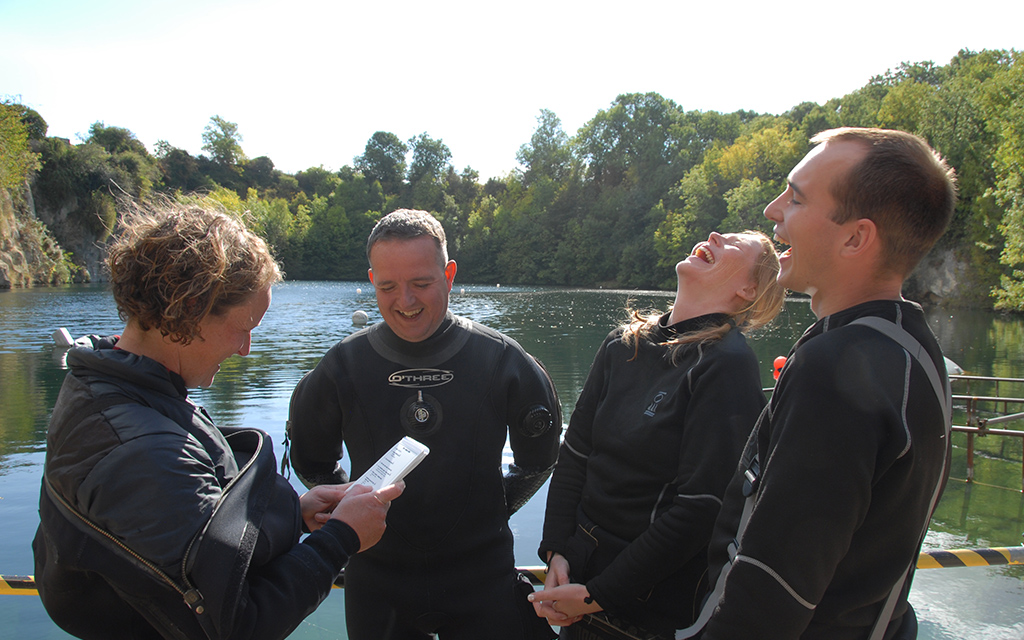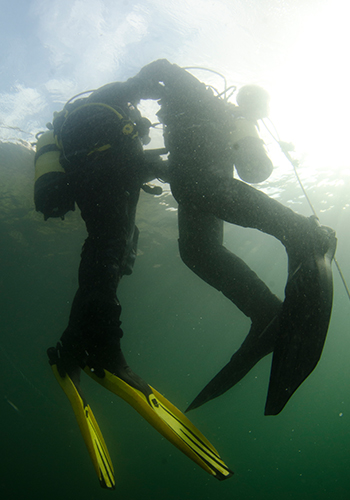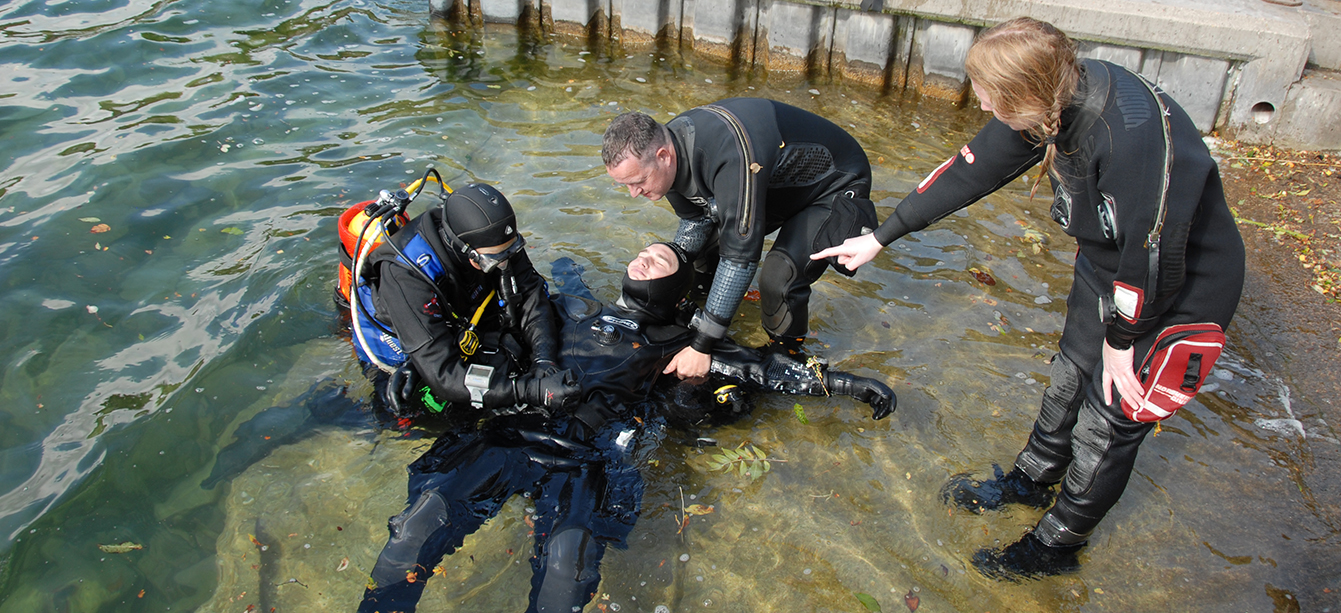
There are no secrets to becoming one of BSAC’s top instructors, says Louise Whitehouse, member of Leeds University SAC and a National Instructor of five years.
This year marks five years since I passed the BSAC NI exam. I remember receiving the news that I'd passed - it was my second attempt at the exam and failing the previous year had been pretty crushing, so it took me a while to summon the courage to open the attachment. I skimmed the first page and all was well: I'd passed.
National Instructor is BSAC’s top instructor qualification: a grade populated by people who are passionate about the future of BSAC training and want to contribute to our organisation. NIs have a high level of theory knowledge, organisational and personal diving skills. They are excellent teachers above and below the water. How do they get there? Well, I have six thoughts to share on that.
1. You can always learn something
So, the first National Instructor secret is that you can always learn and improve. I was was miserable having not passed the exam first time in 2012, especially as I felt as if I was so close to passing, but when things don’t work out as planned you can always derive something positive from the experience. For me, it was an experience that actually gave me a lot more confidence in my ability to teach a lot of things. I still have strengths (and many weaknesses) but reading the positive comments from my first report really helped drive me towards success the second time.
And knowing the areas where I was weak helped me target what I needed to work on next time and in particular the things that I needed to make people see their perception of what they thought I'd do. As a result, I came out if the second exam a much better instructor than I was the first time around and with the confidence to go out and be a National Instructor afterwards which I might have struggled with a year earlier.

2. You need a plan
NIs may seem very good at winging it. They can teach anything, at any time and in any place. In reality, they are experienced divers and experienced instructors, and over the years they have planned how to teach pretty much everything and anything. While they might not have a plan to hand for teaching exactly what's required at that moment in time, they have a plan in mind that will work to deliver what's needed. The more lessons you plan, the broader the toolkit you can call on when someone on a boat asks you what something is or how something works. Plans are adaptable to situations and scenarios and the more frequently you make use of them the more likely you are to be able to make use of them on an ad-hoc basis.
3. Practice makes perfect
If you are teaching you can’t have too much practice, whether of the skill itself or the way to teach it. If you are confident doing something yourself then that will shine through when it comes to teaching someone else what to do. If you find yourself trying to muddle through then not only will it be more difficult for you, but your students won’t have the best example in front of them. As a diver, practice is about doing what you love. It’s not about devoting time to learning facts and figures for no reason, it’s about improving your abilities, understanding and experience so that you can get more out of your time underwater. The secret is that this should all be fun and if it isn’t maybe it’s time for a break.
Practising teaching is also a brilliant opportunity to experiment; experimentation and practice are what gives experienced instructors the scope to develop new and innovative ways of teaching. You can spend time trying new ways before concluding that the tried and tested ways really are the best. As an instructor, allow yourself time to think through your ideas and then out them into practice. Teaching in different ways is great if it adds something to the lesson, innovation for the sake of it can be tenuous, painful and unsuccessful!
4. Teach everything
Get out there; dive and teach. Some of the best instructors are those that can’t help teaching and do it in such a way that you don’t realise how much you’re learning. Teaching as a NI is about taking opportunities to teach - every instructor can start thinking like a NI.
Teaching doesn't have to be about formal lessons and rigid delivery, it can be about taking opportunities to share something relevant with people. It could be a comment on the weather, talking someone through what you're thinking and doing as you put divers in the water, or pointing out the similarities between starfish and sea urchins while underwater.

There aren't really any secrets to being a National Instructor
Sound knowledge, confidence in teaching and some experience of trying different things allows you to apply those skills to everything and anything that you might want to share with people. Sharing a sport you love with other people is a real privilege and one that this NI values.
5. Personalise the lesson
One of the complaints from NIs, when I was preparing for the exam, was that once one candidate has come up with what they think is a perfect skill to teach, everyone teaches it to everyone else until they reaching bursting point. Think about the level of your student and think about what is relevant to them. If you’re in the water with an Advanced Diver it may not be appropriate to coach them on the best finning techniques while on a wreck, but they may not be familiar with the types of local wildlife. Similarly, run-times might be too demanding for a new Ocean Diver, but you can still work through dive planning with them and underwater highlight how you use that plan to keep the dive on track.
6. Don't lecture!
When I think about being a NI, in my head it's all about being out on a boat, teaching while doing some proper diving, but there are times when teaching needs to be done on dry land or in a classroom. When it does, don't forget to engage with your students, endless talking and dry Powerpoint slides aren't any fun for anyone, student or instructor.
Within diving, there are very few things that we need to teach that don't directly link to a practical aspect of the sport. Think about how to make the most of this, students will always be more engaged if they understand the relevance of a subject to them and what they actually want to do (go diving). By taking advantage of this you design the teaching to be relevant to the students and you'll enjoy teaching the lesson more because the focus is on diving rather than seemingly arbitrary theoretical concepts.
Learn more about our National Instructor Qualification
Not yet a BSAC member?
You can do this course by joining BSAC directly or joining your local club.If you need a hand send your postcode to hello@bsac.com and we'll help you find the right scuba club for you. Or if you fancy a chat call us 0151 350 6226 (Mon - Fri, 9 - 5:30).
This Learning Curve article was originally published in SCUBA magazine, Issue 87 February 2019.
Images in this online version may have been substituted from the original images in SCUBA magazine due to usage rights.

 Author: Louise Whitehouse | Posted 17 Oct 2019
Author: Louise Whitehouse | Posted 17 Oct 2019


